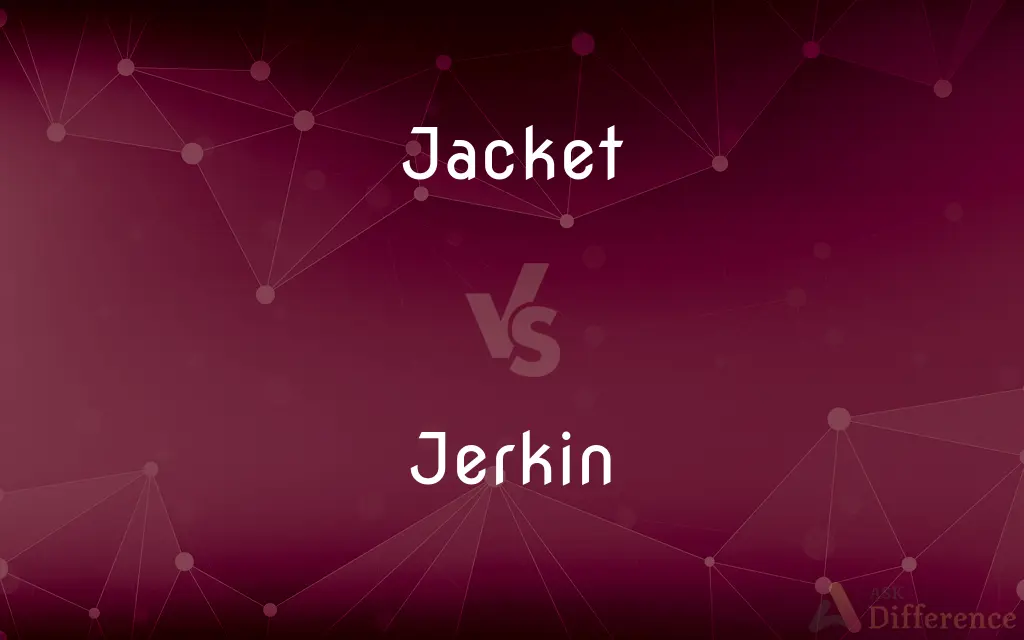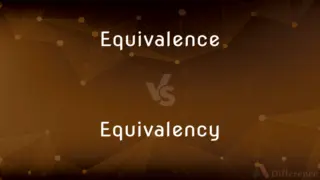Jacket vs. Jerkin — What's the Difference?
Edited by Tayyaba Rehman — By Fiza Rafique — Updated on September 21, 2023
A jacket is a short coat usually with full-length sleeves, commonly worn outdoors. A jerkin is a sleeveless, tight-fitting jacket often made of leather or fabric, usually worn over a shirt for added warmth.

Difference Between Jacket and Jerkin
Table of Contents
ADVERTISEMENT
Key Differences
A jacket is a garment generally designed to cover the upper body and is often made from various materials like cotton, wool, or leather. A jerkin, on the other hand, is a more specific type of garment, usually sleeveless and tight-fitting, often made of leather or heavy cloth.
Jackets come in various styles and lengths, designed for fashion, utility, or both. Jerkins are generally less varied in style and are often associated with historical or period attire, although they have modern counterparts often used for layering.
In terms of functionality, jackets can be versatile, providing both warmth and protection from the elements. Jerkins are usually worn for added warmth, and their sleeveless design makes them less effective for protection against wind or rain.
While jackets are common attire and can be worn by people of all ages and genders, jerkins have a more niche audience. They are often worn in historical reenactments, or as part of uniforms or traditional costumes.
The term "jacket" is used widely and is easily recognized, while the term "jerkin" may not be as commonly understood. The jacket has found its way into everyday language, whereas the jerkin remains a more specialized term.
ADVERTISEMENT
Comparison Chart
Sleeves
Usually has sleeves
Sleeveless
Material
Varied (cotton, wool, leather, etc.)
Often leather or heavy cloth
Functionality
Versatile, for fashion and utility
Primarily for added warmth
Audience
General
Niche, often historical
Language Use
Commonly understood
Less commonly known
Compare with Definitions
Jacket
A short coat typically with long sleeves.
She wore a denim jacket over her dress.
Jerkin
A sleeveless, close-fitting jacket.
He wore a leather jerkin over his shirt.
Jacket
An outer garment for the upper body that provides warmth.
He put on a jacket to fend off the cold.
Jerkin
A garment used for layering in an outfit.
He layered a jerkin over his blouse for a fashionable look.
Jacket
A covering or casing for a book, disk, or other object.
The book's jacket had an intriguing design.
Jerkin
A jacket usually worn for added warmth.
She wore a jerkin to keep warm during the renaissance fair.
Jacket
A jacket is a garment for the upper body, usually extending below the hips. A jacket typically has sleeves, and fastens in the front or slightly on the side.
Jerkin
An item of historical or period attire.
The knight wore a jerkin as part of his costume.
Jacket
A short coat usually extending to the hips.
Jerkin
A garment often made of leather or heavy cloth.
The actor donned a historical jerkin for the play.
Jacket
The skin of a potato.
Jerkin
A sleeveless jacket.
Jacket
The dust jacket of a book or phonograph record.
Jerkin
A close-fitting, hip-length, collarless jacket having no sleeves but often extended shoulders, belted and worn over a doublet by men especially in the 1500s.
Jacket
An insulation covering for a steam pipe, wire, boiler, or similar part.
Jerkin
A short, close-fitting, often sleeveless coat or jacket, usually of leather.
Jacket
An open envelope or folder for filing papers.
Jerkin
(historical) A type of men's garment popular in the sixteenth and seventeenth centuries: a close-fitting collarless jacket, with or without sleeves.
Jacket
The outer metal shell or case of a bullet.
Jerkin
A sleeveless jacket, usually leather; a long waistcoat.
Jacket
A piece of jewelry or other ornament that attaches to an earring stud.
Jerkin
A jacket or short coat; a close waistcoat.
Jacket
To supply or cover with a jacket.
Jerkin
A male gyrfalcon.
Jacket
A piece of clothing worn on the upper body outside a shirt or blouse, often waist length to thigh length.
Jerkin
A tight sleeveless and collarless jacket (often made of leather) worn by men in former times
Jacket
A piece of a person's suit, beside trousers and, sometimes, waistcoat; coat US
Jacket
A protective or insulating cover for an object (e.g. a book, hot water tank, bullet.)
Jacket
(slang) A police record.
Jacket
(military) In ordnance, a strengthening band surrounding and reinforcing the tube in which the charge is fired.
Jacket
The tough outer skin of a baked potato.
Cook the potatoes in their jackets.
Jacket
(Jamaica) A bastard child, in particular one whose father is unaware that they are not the child’s biological father.
Jacket
(Appalachian) A vestUS; a waistcoat UK
Jacket
To confine (someone) to a straitjacket.
Jacket
(transitive) To enclose or encase in a jacket or other covering.
Jacket
A short upper garment, extending downward to the hips; a short coat without skirts.
Jacket
An outer covering for anything, esp. a covering of some nonconducting material such as wood or felt, used to prevent radiation of heat, as from a steam boiler, cylinder, pipe, etc.
Jacket
In ordnance, a strengthening band surrounding and reënforcing the tube in which the charge is fired.
Jacket
A garment resembling a waistcoat lined with cork, to serve as a life preserver; - called also cork jacket.
Jacket
To put a jacket on; to furnish, as a boiler, with a jacket.
Jacket
To thrash; to beat.
Jacket
A short coat
Jacket
An outer wrapping or casing;
Phonograph records were sold in cardboard jackets
Jacket
(dentistry) an artificial crown fitted over a broken or decayed tooth
Jacket
The outer skin of a potato
Jacket
The tough metal shell casing for certain kinds of ammunition
Jacket
Provide with a thermally non-conducting cover;
The tubing needs to be jacketed
Jacket
Put a jacket on;
The men were jacketed
Jacket
A garment designed for a specific activity or protection.
The firefighter wore a flame-resistant jacket.
Jacket
A fashionable outerwear item for the upper body.
That leather jacket looks really stylish on you.
Common Curiosities
What is a jacket?
A jacket is a short coat usually with full-length sleeves.
What materials are jackets commonly made of?
Jackets can be made from a variety of materials like cotton, wool, or leather.
Do jerkins have sleeves?
Jerkins are typically sleeveless.
Are jackets versatile?
Yes, jackets can be both fashionable and functional.
Are jerkins versatile?
Jerkins are generally less versatile and are often worn for added warmth.
Do jackets have sleeves?
Jackets usually have full-length sleeves.
What materials are jerkins commonly made of?
Jerkins are often made of leather or heavy cloth.
Who usually wears jerkins?
Jerkins are often worn in historical reenactments or as part of traditional costumes.
Who usually wears jackets?
People of all ages and genders commonly wear jackets.
How common is the term 'jacket'?
The term 'jacket' is widely recognized.
Can jackets be used for protection?
Yes, some jackets are designed to offer protection against the elements or hazards.
What is a jerkin?
A jerkin is a sleeveless, tight-fitting jacket often made of leather or fabric.
What's the primary difference between a jacket and a jerkin?
The primary difference is that jackets usually have sleeves and are more versatile, while jerkins are sleeveless and generally worn for added warmth.
How common is the term 'jerkin'?
The term 'jerkin' is less commonly understood.
Can jerkins be used for protection?
Jerkins are less effective for protection due to their sleeveless design.
Share Your Discovery

Previous Comparison
Serum vs. Vaccine
Next Comparison
Equivalence vs. EquivalencyAuthor Spotlight
Written by
Fiza RafiqueFiza Rafique is a skilled content writer at AskDifference.com, where she meticulously refines and enhances written pieces. Drawing from her vast editorial expertise, Fiza ensures clarity, accuracy, and precision in every article. Passionate about language, she continually seeks to elevate the quality of content for readers worldwide.
Edited by
Tayyaba RehmanTayyaba Rehman is a distinguished writer, currently serving as a primary contributor to askdifference.com. As a researcher in semantics and etymology, Tayyaba's passion for the complexity of languages and their distinctions has found a perfect home on the platform. Tayyaba delves into the intricacies of language, distinguishing between commonly confused words and phrases, thereby providing clarity for readers worldwide.
















































